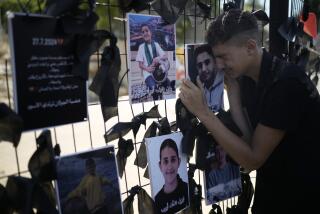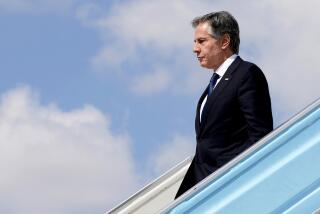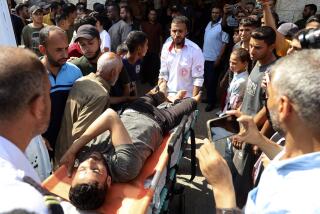Democratic foreign policy figures press for intervention in Syria
WASHINGTON — President Obama’s vow to limit U.S. involvement in the Syrian civil war is being criticized from a usually sympathetic quarter: the Democratic foreign policy establishment.
Senior Democratic foreign policy figures, along with diplomats who have worked for Democratic administrations, are saying the administration needs to do more to avoid a humanitarian catastrophe and preserve U.S. influence in a key Mideast state.
The views of these figures, including former Clinton administration Defense Secretary William Perry and former Obama administration officials Ann-Marie Slaughter and Dennis Ross, add to pressure on the White House from regional allies and Republican rivals as the Syrian conflict has intensified.
Photos: Syria conflict [Graphic content]
“You’ve seen more calls for action, starting on the right and now on the left,” said Jamie Fly, executive director of the Foreign Policy Initiative, a conservative group that advocates a strongerU.S. militaryrole in Syria. He said the evolving nature of the war — including the regime’s use of more deadly aircraft, the rising death toll and fear of a growing terrorist presence — has led to more voices calling for action.
The Obama administration has imposed sanctions and diplomatic pressure on the regime of President Bashar Assad. It also is providing nonlethal aid, such as communications gear, to the Syrian rebels.
But the White House fears that military involvement could intensify a sectarian proxy war, and it worries about divisions among world powers and war-weariness at home. Also, Syria has formidable Russian-built air defenses that are supported by Russian personnel.
Susan Rice, U.S. ambassador to the United Nations, told MSNBC on Thursday that “the reality is that a no-fly zone is not a simple proposition” and would involve putting in troops as well as destroying air defenses “that are among the most sophisticated in the world.”
The Democratic critics, while stopping short of proposing a ground invasion, maintain that more must be done.
Perry, secretary of Defense during the Bosnian civil war, said in an email that he favors a “no-fly, no-drive zone” in northern Syria that would provide safety for insurgents and civilians. Ross, a top administration national security aide until November, has also been advocating creation of a safe zone in northern Syria, like the one the United States created in northern Iraq after the 1991 Persian Gulf war.
Slaughter, former head of the State Department’s policy planning office, has urged that rebel commanders be supplied with sophisticated antitank and antiaircraft weapons if they commit to protecting civilians and vow to not engage in sectarian killings.
Madeleine Albright, secretary of State under President Clinton, said in an interview that she finds no fault with the Obama administration’s efforts to date and would not support a “flat-out military intervention.”
But she said the U.S. and other world powers should now be “sorting out whether various humanitarian corridors can be established for the refugees” and whether more can be done to provide humanitarian and logistics aid.
“I’m very concerned about what’s happening to the people,” she said.
Sen. John Kerry (D-Mass.), chairman of the Senate Foreign Relations Committee, has suggested that the administration and other governments take another look at the idea of creating safe zones in Syria.
Administration officials said this week that they were still considering all the ideas, including no-fly zones. On Friday, they announced new economic sanctions on Syria and a new terrorist blacklisting of Hezbollah, a Syrian-allied Shiite Muslim militia in Lebanon, because it has been providing training and operational aid to the regime.
Meanwhile, the British government announced that it was giving the Syrian opposition $7.8 million in medical supplies and electronic and communications gear.
Fighting and military shelling continued Friday in the Syrian city of Aleppo as rebels said they had regained control of the strategic Salahuddin neighborhood. More than 80 people were killed, including 45 whose unidentified bodies were found in a park in Salahuddin, activists said.
The U.S. role in Syria has divided Republicans as well as Democrats.
The dominant Republican point of view is that of Sens. John McCain (R-Ariz.) and Lindsey Graham (R-S.C.), who have called for the U.S. to provide arms, intelligence and training to the opposition and to use air power to help protect the de facto safe zones that are taking shape in northern Syria. But some Republican heavyweights, including former secretaries of State Henry Kissinger and James Baker, have urged caution.
Mitt Romney, the presumed GOP presidential candidate, has called for more assertive U.S. action on Syria but not offered specifics, suggesting that he is wary of appearing too eager for military action.
Polls indicate that there is not widespread support for a majorU.S. militaryrole in Syria despite the mounting death toll.
About two-thirds of Americans say the United States is not required to intervene militarily in Syria because they believe that it is “important but not vital” to U.S. security, said Andrew Kohut, president of the Pew Research Center.
A Times staff writer in Beirut and Times staff writer Henry Chu in London contributed to this report.
More to Read
Sign up for Essential California
The most important California stories and recommendations in your inbox every morning.
You may occasionally receive promotional content from the Los Angeles Times.











